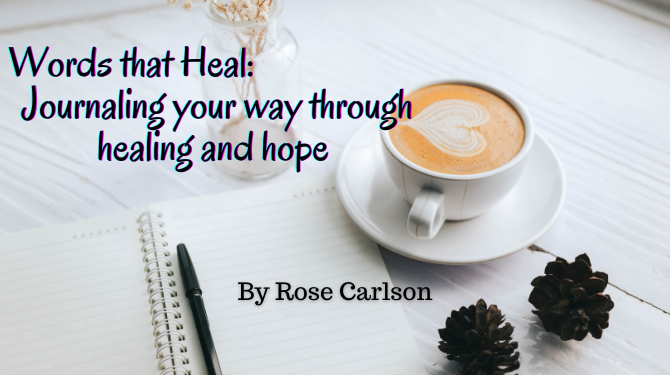
Words that Heal: Journaling your way through healing and hope
By: Rose Carlson
People often feel intimidated by the thought of journaling because they think they are not good writers. Perhaps they have bad memories of papers and English classes with red pen marks pointing out every mistake. But journaling is not about “good” writing. Or grammar. Or punctuation. Or spelling. Or any of that. Simply put, it’s about putting the thoughts in your head onto paper. Doing so helps you process and make some sense of them. In short, you are doing it for you, not for anyone else to read and critique.
Why is journaling helpful?
Writing/journaling can:
- be a healthy outlet for processing painful feelings and emotions, especially for those who may not have a great deal of support from their family and friends.
- provide a permanent record of your experiences. You may think you will never forget certain feelings and times, but they do tend to fade.
- help you focus on and clarify what your real needs are while you are mourning, healing, and trying to make plans for your future.
- enable you to “talk” about things you really do not have the energy to talk about.
- help you find ways to have a meaningful ongoing relationship with your baby.
- help you sleep better if you write at night before bed.
Additionally:
- Reading through the past things you have written can help you see how far you have come and can be healing. As time goes by, you may think you are not progressing at all, yet when you go back and read your journal, you can have more clarity into just how far you have come. Do not go back and read what you have written too soon, though, as you may be tempted to delete and change what you wrote.
- Writing out your emotions has been proven by research to lower stress, depression, and anxiety.
When you are deeply grieving, your thoughts and emotions can feel scattered all over the place. They can be hard to wrap your mind around and make sense of. When you sit down to write, while your mind and thoughts may wander, getting them out in a visible form can help you make sense of them. It can help you whittle them down to what might really be going on in your heart. It can help you put them in perspective. It is common to start writing about one thing only to be surprised by what you end up writing. This is normal and to be expected.
Tips for getting the most out of journaling
- The most important thing to keep in mind when you start journaling is to tell the truth. Always be honest about your feelings and experiences. It can be difficult to write freely, even to yourself, but you will glean the most benefits from writing when you do not censor your words and emotions. Always give yourself permission to write your truths.
- Do not worry about others reading your words. I cannot stress this enough. When you journal, you are writing for yourself, so resist the urge to think about who may read what you write. You will find it difficult to truly be honest in your writing if you are worried about who will read it. If you write in a paper journal, find a good hiding spot. If you journal on a computer, you can password-protect what you write.
- There are no rules. Pick a certain time of day or write whenever the mood strikes you. Choose a writing prompt, or freely write whatever is on your heart and mind. Set a timer and decide to write for that amount of time, or simply write for however long you feel moved to write. Do not set unrealistic goals for yourself. It can be helpful, especially in the beginning, to write every day to establish a habit, but do not put that pressure on yourself. If you do decide to journal every day, do not give up if you end up not sticking to that.
- If you struggle to begin, make lists. This can feel less overwhelming than writing paragraphs. Journaling prompts can help you get started, too.
- Do not worry about punctuation, spelling, or grammar. No one is grading you.
- Just start! Do not overthink it.
- If you end up off-topic, that is okay! Sometimes, what you start with is only a jumping-off place that helps you get to where you need to go.
- It can help if you pretend you are writing to a friend or other loved one. What would you say to them if you could?
- Some grieving parents like to use their journals to write letters to their babies. This can be an easy way to get started, too.
Atmosphere can make a difference
- Try to make the space you write in as calm and soothing as possible so you will look forward to your writing time. Play soft music, burn a scented candle you love, make a cup of your favorite tea, or whatever else helps you relax.
- While you do not need anything fancy to journal, just a notebook and pen or computer is plenty, you might be more inspired to keep up your journaling practice if you have a pretty journal and nice pens or pencils. Do not just use any old pen with a broken cap and splotchy ink from your junk drawer.
- You can use drawings, doodles, stickers, or photographs to add creative touches to your journal and make the process more inviting.
Overcoming roadblocks
If you are not already someone who enjoys writing and journaling, it can feel awkward at first, and you might encounter roadblocks or things that make you want to not write. It can be hard to put your deep feelings and raw emotions into written words because doing so can make them seem more real. However, once you start a journaling practice, it does slowly come more naturally, especially if you begin to feel it is helping you process your grief and what is happening in your life because of it. If you are writing about something you find too emotional or difficult, take a break and come back to it another time.
Life can seem too busy to indulge in quiet time to write. It can be helpful to put it into your schedule as you will be more likely to stick with it. Even writing for 15 minutes at a time can be beneficial.
As I’ve already mentioned, shying away from your intense emotions can be a stumbling block and prevent you from fully experiencing the healing that can come from writing. Again, the more you do it, the easier it becomes. Acknowledge to yourself that this is hard, and why it is hard, but tell yourself you are going to do it anyway. It sounds simple, but it works.
When you are having a hard time starting, simply writing your journaling prompt over and over can give you a jumpstart. Or start by writing something like, “I don’t know what to write, but…” and see where that takes you. You can also start by listing things you are feeling at that moment, and it may get the words flowing more freely.
Do not go back to rewrite or edit your words unless you have a good reason for wanting to polish something you wrote. Let your journaling stand as you wrote and felt at the time.
Another good way to start is to go back through your social media posts, emails, and texts and start compiling them into one document in time order of when you wrote them. This is its own form of journaling and may inspire you to write more about a topic you did not feel comfortable putting on social media.
Writing about difficult things and emotions may leave you feeling out of sorts a bit. One thing you can do to overcome this if you feel up to it, is end with imagining what that situation may be like, or how you would like it to be, in the future to end your writing on a more positive note. Skip a few lines and type it in italics or write it in a different color pen to denote this is your dream scenario for whatever difficult situation you are in right now.
If you have wanted to start journaling but are not sure where to begin, I hope I have inspired you to just begin! There are no rules, and the things you write do not have to make sense to anyone but you. You may want to start journaling to try to make sense of your grief, but you may end up gaining more benefits and learning more about yourself than you imagined.
If you journal, please share how you found it helpful.

About Rose Carlson
Rose is the Program Director at Share Pregnancy and Infant Loss Support. She came to Share in 2002 as a volunteer and eventually joined the staff in 2004. She has a BS in Psychology with a minor in Sociology. Her personal experience as a bereaved parent brings an invaluable perspective to her work. Rose manages the Share Memorial events, serves as an educator and is the Share Chapter coordinator.
